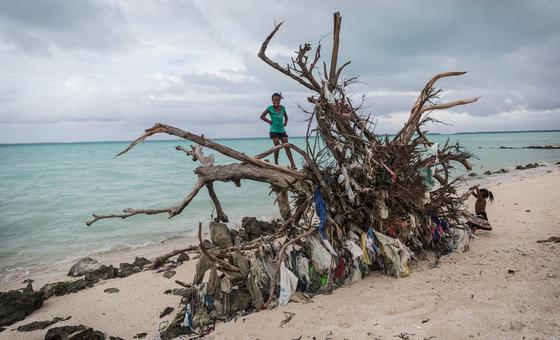At a time when people are hurting and the planet is burning, the world’s advanced economies can take the lead in ensuring financial, structural and climate justice, the UN Secretary-General said in remarks to the virtual G20 Summit convened by India on Wednesday.
António Guterres said the world, particularly developing countries, is facing “a perfect storm”, with growing inequalities, climate chaos, conflicts and hunger. Meanwhile, fiscal space is tightening for many, with crushing debt burdens and skyrocketing prices.
“This is a recipe for global instability and suffering,” he said, speaking from Santiago, Chile.
Support for SDG Stimulus
The UN chief called for G20 members to help lead the way in financial justice and commended their support for his $500 billion annual stimulus plan to accelerate achievement of the Sustainable Development Goals (SDGs).
Mr. Guterres said he will establish a Leaders Group to monitor the implementation of the SDG Stimulus to enable $500 billion in additional long-term development finance.
Reform ‘unfair’ financial systems
He underscored the need to work to reform the current global financial architecture, describing it as “outdated, dysfunctional and unfair”, and commended the bloc’s action to reform multilateral development banks, as well as Brazil’s focus on global governance during its presidency of the forum.
However, “practical solutions must be tabled” at the Summit of the Future next September, he stressed, referring to the UN conference to reaffirm commitment to sustainable development.
Deliver on climate promises
Mr. Guterres is in Chile and will travel to Antarctica before heading to the UN climate conference COP28 which opens next week in Dubai.
He urged the G20 to deliver “an ambitious, credible and just outcome” to keep the goal of limiting global warming to 1.5 degrees Celcius above pre-industrial levels, as outlined in the Paris Agreement on climate change.
“This means getting the loss and damage fund up-and-running with early pledges, delivering all promised financial support, tripling renewables capacity, doubling energy efficiency, and bringing clean power to all by 2030,” he said.
“It also means phasing-out fossil fuels, with a clear timeframe aligned to the 1.5-degree limit.”
Israel-Hamas agreement
Mr. Guterres began his remarks by welcoming the agreement reached by Israel and Hamas on a humanitarian pause in Gaza and the release of hostages.
“This is an important step in the right direction, but much more needs to be done to end the suffering,” he said.
He added that the UN “will mobilize all its capacities to support the implementation of the agreement and maximize its positive impact on the dramatic humanitarian situation in Gaza.”

